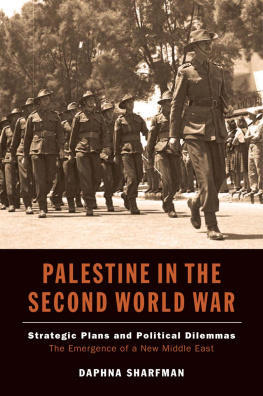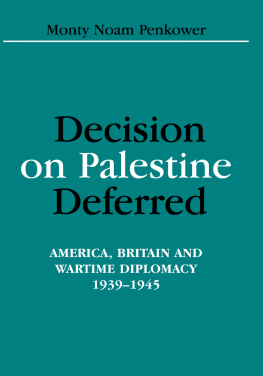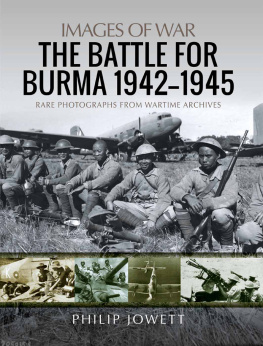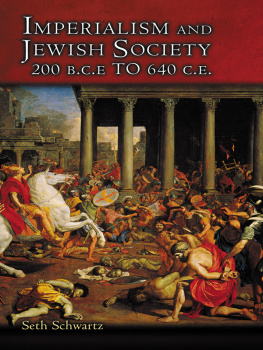Daphna Sharfman skillfully navigates through this labyrinth of players, interests and goals. She interweaves major events with ordinary peoples experiences linking political processes and military moves with daily life and social phenomena into a vivid, coherent and penetrating picture of life in Palestine during those crucial years. From the Foreword by Yoav Gelber, author of Palestine 1948: War, Escape and the Emergence of the Palestinian Refugee Problem, Professor Emeritus, University of Haifa
While the conflicts and national aspirations in British mandatory Palestine in particular and the Middle East in general were evident before the outbreak of the Second World War, the war itself accelerated and enhanced national expectations and presented continuing tactical and strategic dilemmas to British, Arab and Jewish leaders. British strategic policy during the war failed to provide answers to the political issues of the growing national demands in Palestine, and led to severe distrust of British policy among Arabs and Jews, as the two communities were framing mostly opposing reactions to wartime developments, and to conflicting expectations and policies towards post-war solutions for Palestine.
The aim of this work is to analyse the continual development of strategic plans and political dilemmas that arose during the war period, which led to the subsequent post-war circumstance where American and Soviet involvement impacted on the strategic thinking of all involved parties, notwithstanding the British military victory. Analysis includes: the pre-war British strategic situation in Palestine, and the war events in Palestine and its Middle East neighbour countries (at the military-strategic level and the repercussions of the outcome of the war for the local Palestinian population). At the heart of the discussion lies British interests and policies framed towards Jews and Arabs; analysis of the two communities conflicting interests and policies; and the resultant sea-change in the establishment of the Jewish state which brought in its wake the emergence of a New Middle East.
Cover illustration: Aussie Day Australian soldiers march in Ben Yehuda Street, Tel Aviv, 10 July 1940. Photo by Pinn Hans, The State of Israel National Photo Collection.
Dr. Daphna Sharfman is a lecturer in the Political Science Department, Western Galilee College, Israel. She is the author of books and articles in the fields of human rights, Israeli government, human rights and foreign policy, and the British mandate in Palestine history.

Copyright Daphna Sharfman, 2014.
Published in the Sussex Academic e-Library, 2014.
SUSSEX ACADEMIC PRESS
PO Box 139
Eastbourne BN24 9BP, UK
and simultaneously in the United States of America and Canada
All rights reserved. Except for the quotation of short passages for the purposes of criticism and review, no part of this publication may be reproduced, stored in a retrieval system or transmitted in any form or by any means, electronic, mechanical, photocopying, recording or otherwise, without the prior permission of the publisher.
British Library Cataloguing in Publication Data
A CIP catalogue record for this book is available from the British Library.
Library of Congress Cataloging-in-Publication Data
Sharfman, Daphna.
Palestine in the Second World War : strategic plans and political dilemmas, the emergence of a new Middle East / Daphna Sharfman.
pages cm
Includes bibliographical references and index.
ISBN 978-1-84519-526-7 (h/b : alk. paper)
ISBN 978-1-78284-076-3 (e-pub)
ISBN 978-1-78284-077-0 (e-mobi)
ISBN 978-1-78284-078-7 (e-pdf)
1. World War, 1939-1945Palestine. 2. PalestineHistory1929-1948. 3. ZionismPalestineHistory20th century. 4. Arab nationalism PalestineHistory20th century. 5. PalestineStrategic aspects. I. Title.
DS126.3.S427 2014
956.9404dc23
2013037750
This e-book text has been prepared for electronic viewing. Some features, including tables and figures, might not display as in the print version, due to electronic conversion limitations and/or copyright strictures.
Contents
Index
Foreword by Yoav Gelber
Palestine was not a theater of war in World War II. Military operations were sporadic and minor, and the bloodiest was the bombing of Tel Aviv in September 1940 by six Italian bombers that in a few minutes killed about 130 persons. The Haifa area was bombed several times, Italian submarines operated close to the Palestine coast and one was sunk opposite Haifa harbor. Though it was not a battlefield, Palestine was strategically significant as the only land connection between Africa and Asia, as the secondary basis of the British Royal Navy in the Eastern Mediterranean and as a stopover on the air route from the United Kingdom to the Far East.
Three times during the war Palestine came under direct threat. The first time was in the summer of 1940, after the surrender of France, when the French authorities in Syria decided to follow the government at Vichy. Both Britons and Jews were afraid then of a possible resumption of the Palestinian Arab rebellion, but the fears proved groundless. The second and most crucial time was in the spring of 1941, when Britains whole position in the Near East appeared to collapse. This time the Yishuv was hysterical, and many of the phenomena that were later attributed to the next scare in the summer of 1942 actually took place a year earlier. The crisis was also the background of the establishment of the SOE (Special Operations Executive) bureau in Jerusalem and the preliminary preparation of the country for a possible occupation by the Axis powers. The third time was in June-July 1942, with the advent of Rommel at El-Alamein. This time the panic was brief and waned quickly. Still, Palestine was declared safe only in the spring of 1943, with the removal of the blackout regime.
Though its role in the military history of World War II was marginal Palestine was material to the political history of the War period. Its unique conditions the competition of two nations over the same small piece of land, the special affiliation of the British Mandate to the Balfour Declaration, the connections of the Yishuv to the Jewish communities that were exterminated in Europe and the conflicts between them all shaped the framework for Britains policy in Palestine both by itself and as part of its Middle East policies.
Unlike World War I, in this war the Jews had no space for political maneuvering. The Yishuv and World Jewry had no alternative but to back the Allies. The British knew it and could afford anti-Jewish steps to placate the Arabs, who could choose between the Allies and the Axis. The British did not assess the relative contribution of the Jews and the Arabs to their war effort, but weighed up the Jews value against the Arabs capacity to cause damage, not only in Palestine but in the entire Middle East. This was the background of the White Paper policy at the beginning of the war and as long as Britains position was precarious it remained in force.
The Palestinian Arabs were paralyzed during the war, and barely recovered from their defeat by the British army in 19361939. Arab society leaked its wounds, remained divided and was economically ruined. It lacked leadership, and no Arab dignitary was ready to risk occupying the Muftis place while he was in Germany. In all the deliberations on the establishment of the Arab League Britains principal political achievement of the War period in the Middle East the Palestinian Arabs were absent.
Next page










